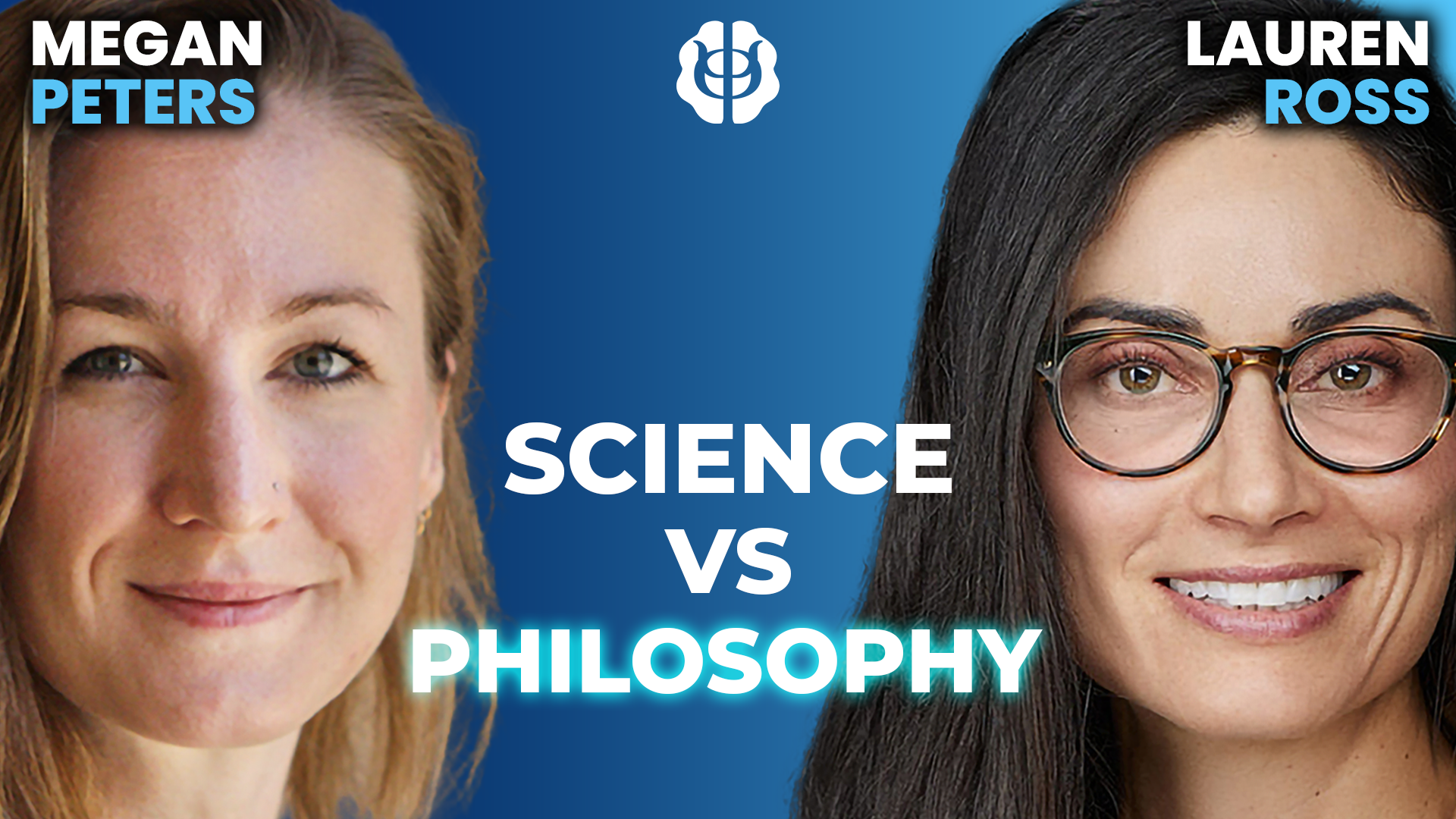Bridging the Divide Between Science and Philosophy

Welcome to our exploration of the fascinating intersection of science and philosophy! In an era often characterized by specialization, it's easy to perceive these disciplines as separate, even divergent. However, as we'll discuss in this blog post, science and philosophy are not mutually exclusive; rather, they engage in a synergistic relationship that enhances understanding across various domains. We will debunk common myths and examine the concrete ways in which philosophical insights can inform scientific inquiry, and empirical data can enrich philosophical thought.
This blog post aims to expand on the ideas discussed in our latest podcast episode, Why Science and Philosophy Need Each Other | Lauren Ross & Megan Peters, where we had the privilege of hosting Dr. Lauren Ross, a philosopher of science, and Dr. Megan Peters, a computational neuroscientist. Together, we delved into the crucial roles that both science and philosophy play in pushing the boundaries of knowledge. If you enjoyed the podcast or are new to these concepts, this article will provide additional context and insights into why a collaborative approach between these fields is more vital now than ever.
Introduction: Bridging the Divide Between Science and Philosophy
Historically, science and philosophy were intertwined. Natural philosophy, the precursor to modern science, encompassed both empirical observation and abstract reasoning. However, with the rise of specialized scientific disciplines in the 19th and 20th centuries, a perceived divide emerged. Science became increasingly focused on empirical data, experimentation, and the development of testable theories, while philosophy often grappled with abstract concepts, ethics, and the nature of knowledge itself.
Yet, this separation is both artificial and counterproductive. Science, at its core, relies on philosophical assumptions about the nature of reality, the validity of observation, and the criteria for explanation. Conversely, philosophy benefits from the grounding of empirical data, which provides a rich source of material for philosophical reflection and analysis. Bridging this divide is essential for addressing some of the most pressing questions of our time, particularly in fields like consciousness research, artificial intelligence, and bioethics.
Debunking the Myth: "Anything Goes" in Philosophy
One common misconception is that philosophy is a realm where "anything goes," lacking the rigor and empirical grounding of science. This view often portrays philosophy as purely speculative, disconnected from the real world. However, this is a gross oversimplification. While philosophical inquiry does involve abstract thought experiments and conceptual analysis, it is not devoid of constraints or standards of evaluation.
Philosophical arguments are typically evaluated based on their internal consistency, logical coherence, and explanatory power. Philosophers build upon the work of their predecessors, engaging in critical dialogue and refining existing theories. Furthermore, many philosophical arguments are informed by empirical data and scientific findings. For example, ethical debates about artificial intelligence are heavily influenced by our understanding of AI capabilities and potential impacts. Similarly, philosophical theories of mind are often informed by neuroscience and cognitive psychology.
How Philosophy Enriches Scientific Inquiry
Philosophy plays several critical roles in enriching scientific inquiry. First, it provides a framework for clarifying concepts and definitions. Scientific concepts like "causation," "explanation," and "evidence" are not always straightforward, and philosophical analysis can help refine their meanings and identify potential ambiguities. This conceptual clarity is essential for designing rigorous experiments and interpreting results accurately.
Second, philosophy helps scientists identify and evaluate the underlying assumptions that shape their research. Every scientific theory rests on a set of assumptions, some of which may be implicit or unacknowledged. By explicitly examining these assumptions, philosophy can help scientists avoid biases and explore alternative perspectives. For instance, philosophical discussions about the nature of scientific realism can influence how scientists interpret the relationship between their models and the real world.
Third, philosophy helps scientists grapple with ethical implications of their research. Scientific advancements often raise complex ethical questions about the responsible use of technology, the protection of human subjects, and the distribution of benefits and risks. Philosophical ethics provides tools for analyzing these issues and developing ethical guidelines for scientific practice.
The Synergistic Collaboration: Philosophy and Science in Action
The synergistic collaboration between science and philosophy is evident in several areas of research. In cognitive science, for example, philosophical inquiry into the nature of consciousness informs the design of experiments aimed at identifying the neural correlates of subjective experience. Conversely, empirical findings from neuroscience can challenge or refine philosophical theories of mind.
In the field of artificial intelligence, philosophy plays a crucial role in addressing questions about AI ethics, the nature of intelligence, and the potential risks of autonomous systems. Philosophers contribute to discussions about algorithmic bias, the moral status of AI entities, and the implications of AI for human autonomy and responsibility. At the same time, advances in AI technology provide new tools for exploring philosophical questions about the nature of knowledge, reasoning, and decision-making.
Brains as Model-Builders: The Role of Uncertainty and Subjective Experience
One particularly fruitful area of collaboration between science and philosophy involves the study of the brain as a model-builder. Cognitive scientists and neuroscientists increasingly view the brain as an organ that constantly generates predictions about the world and updates these predictions based on sensory input. This "predictive processing" framework highlights the role of uncertainty, inference, and subjective experience in shaping our perception of reality.
Philosophy can contribute to this research by providing conceptual tools for understanding the nature of models, the relationship between models and the world, and the role of subjective experience in shaping our understanding. Philosophical discussions about the nature of representation, intentionality, and consciousness can help scientists refine their theories about how the brain constructs its models of reality.
Explanation in Science: Beyond Description to Understanding 'Why'
A central goal of science is to provide explanations for phenomena. However, what counts as a good explanation is not always clear-cut. While descriptive accounts can provide valuable information about what happens, they do not necessarily explain why it happens. True scientific explanation goes beyond mere description to provide a deeper understanding of the underlying mechanisms and causal relationships.
Philosophy can help scientists clarify their goals of explanation and identify the criteria for evaluating different explanations. Philosophical discussions about the nature of causation, mechanism, and reduction can help scientists develop more robust and informative explanations.
Defining the Explanatory Target in Consciousness Research
Consciousness research provides a particularly challenging case for scientific explanation. Defining the explanatory target – what exactly needs to be explained – is a crucial first step. Is the goal to explain subjective experience itself, or simply to identify the neural correlates of consciousness? Different explanatory targets may require different methods and approaches.
Philosophy can contribute to this debate by providing conceptual tools for understanding the nature of consciousness and identifying the different aspects of subjective experience that need to be explained. For example, philosophical distinctions between phenomenal consciousness (what it feels like to have an experience) and access consciousness (the ability to report or reflect on an experience) can help scientists refine their research questions and design more targeted experiments.
Types of Explanation: Causal, Mechanistic, Computational, and Mathematical
Different scientific disciplines often employ different types of explanation. Causal explanations identify the causes that bring about a particular effect. Mechanistic explanations describe the underlying mechanisms that produce a phenomenon. Computational explanations model the behavior of a system using mathematical equations and algorithms. Mathematical explanations demonstrate how a phenomenon is a necessary consequence of mathematical principles.
Understanding the different types of explanation and their strengths and limitations is essential for developing comprehensive scientific theories. Philosophy can help scientists clarify the relationships between these different types of explanation and identify the conditions under which each type is most appropriate.
Levels of Analysis: Matching Methods to Questions
Scientific explanation often involves analyzing phenomena at multiple levels of analysis, from the molecular level to the level of the whole organism or even the entire ecosystem. Choosing the appropriate level of analysis is crucial for addressing specific research questions. For example, understanding the neural basis of consciousness may require analyzing brain activity at multiple levels, from the activity of individual neurons to the interactions between different brain regions.
Philosophy can help scientists develop a coherent framework for integrating different levels of analysis and identify the relationships between them. Philosophical discussions about reductionism and emergence can help scientists understand how phenomena at one level of analysis can be explained in terms of phenomena at a lower level, and how new properties can emerge at higher levels of organization.
The Microprocessor/Mario Example: Limitations of "Perfect Access"
The example of trying to understand how a microprocessor runs the game "Mario" illustrates the limitations of "perfect access" in scientific explanation. Even if we had complete knowledge of the physical state of the microprocessor at every moment in time, it would not necessarily provide a satisfying explanation of how the game works. To understand the game, we need to understand the software code, the algorithms, and the goals of the game designers.
This example highlights the importance of considering multiple levels of analysis and different types of explanation. Understanding the physical implementation of a system is not sufficient for understanding its function or purpose. We also need to understand the informational and computational aspects of the system.
Groundbreaking Work: Metacognition, Psychophysics, and Linking Models to Experience
Significant advancements are being made in areas like metacognition and psychophysics, which aim to link internal models to subjective experiences. Metacognition, the ability to reflect on one's own thoughts and cognitive processes, offers a window into how we monitor and control our own minds. Psychophysics, which studies the relationship between physical stimuli and subjective perceptions, provides valuable data for understanding how sensory information is processed and transformed into conscious experience.
By combining these approaches, scientists are developing increasingly sophisticated models of how the brain generates subjective experience. Philosophy can play a crucial role in interpreting these models and identifying their implications for our understanding of consciousness and the self.
Processing "Under the Hood": The Brain's Unconscious Processes
Much of what the brain does occurs "under the hood," without our conscious awareness. Unconscious processes play a crucial role in perception, action, and decision-making. Understanding these unconscious processes is essential for developing a complete understanding of the mind.
Philosophy can contribute to this research by exploring the nature of unconscious mental states and their relationship to conscious experience. Philosophical discussions about the nature of intentionality, representation, and access can help scientists refine their theories about how unconscious processes contribute to our cognitive abilities.
Vision Science and the Limits of Introspection
Vision science provides compelling evidence for the limits of introspection. Many aspects of visual processing occur unconsciously, and we have no direct access to the computations that underlie our visual perceptions. For example, we are not aware of the complex algorithms that the brain uses to infer depth, shape, and color from the retinal image.
This evidence challenges the assumption that introspection is a reliable source of information about the mind. It suggests that we need to rely on objective scientific methods, rather than subjective reports, to understand how the brain works.
The Debate on Consciousness as an Epiphenomenon
The question of whether consciousness is an epiphenomenon – a byproduct of brain activity that has no causal effect on behavior – is a topic of ongoing debate. Some argue that consciousness is merely a passive observer, while others maintain that it plays a crucial role in decision-making and action.
Philosophy can contribute to this debate by clarifying the concept of causation and identifying the criteria for determining whether a phenomenon has causal efficacy. Philosophical arguments about the nature of free will and moral responsibility are also relevant to this debate.
The Precision of Questions: Asking the Right Questions for Better Explanations
The precision of our questions is crucial for obtaining better explanations. Vague or poorly defined questions can lead to ambiguous answers and unproductive research. By contrast, well-defined and specific questions can guide scientific inquiry and lead to more informative explanations.
Philosophy can help scientists formulate precise and meaningful questions by clarifying concepts, identifying assumptions, and exploring alternative perspectives. Philosophical analysis can also help scientists evaluate the significance and potential impact of different research questions.
Plurality of Explanatory Targets: Accepting Piecemeal Explanations
Given the complexity of the brain and the mind, it is unlikely that we will ever achieve a single, comprehensive explanation of consciousness or any other cognitive phenomenon. Instead, we should accept the idea that scientific explanation is often piecemeal, involving multiple explanatory targets and different levels of analysis.
This pluralistic approach allows us to make progress on specific aspects of a phenomenon, even if we do not yet have a complete understanding of the whole. By combining different types of explanation and integrating different levels of analysis, we can gradually build a more comprehensive picture of the mind.
Building Interdisciplinary Communities: Bridging Science and Philosophy
Bridging the gap between science and philosophy requires building interdisciplinary communities that foster communication and collaboration. Scientists and philosophers need to engage in dialogue, share their perspectives, and learn from each other's expertise.
These interdisciplinary communities can take many forms, including joint research projects, interdisciplinary conferences, and educational programs that integrate science and philosophy. By creating opportunities for collaboration, we can foster a more holistic and integrated approach to understanding the world.
Future Horizons for Consciousness Research: Challenges for Philosophy
Consciousness research presents numerous challenges for philosophy. Philosophers need to grapple with questions about the nature of subjective experience, the relationship between consciousness and the brain, and the ethical implications of manipulating or creating conscious beings. As scientific knowledge about the brain advances, philosophy will need to adapt and evolve to address new questions and challenges.
The Transformative Potential of a Philosophically Informed Neuroscience
A philosophically informed neuroscience has the potential to transform our understanding of the mind, the brain, and the nature of reality. By integrating philosophical insights with empirical data, we can develop more comprehensive and nuanced theories of cognition, consciousness, and behavior. This integrated approach can also inform the development of new technologies, such as artificial intelligence and brain-computer interfaces, in a responsible and ethical manner.
Conclusion: Embracing the Symbiotic Relationship between Science and Philosophy
In conclusion, the relationship between science and philosophy is not one of opposition but of symbiosis. As we have seen, philosophy enriches scientific inquiry by clarifying concepts, identifying assumptions, and addressing ethical implications. Conversely, science enriches philosophy by providing empirical data and new insights into the nature of reality. By embracing this symbiotic relationship, we can push the boundaries of knowledge and achieve a deeper understanding of ourselves and the world around us.
We hope this blog post has shed light on the crucial intersection of science and philosophy, mirroring the engaging discussion we had in our podcast episode, Why Science and Philosophy Need Each Other | Lauren Ross & Megan Peters. We encourage you to listen to the episode to hear Dr. Lauren Ross and Dr. Megan Peters elaborate on these ideas and consider how a combined scientific and philosophical perspective can offer profound insights into the complexities of our existence.








